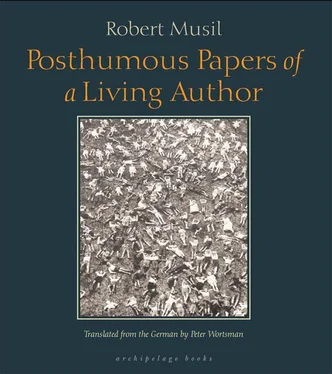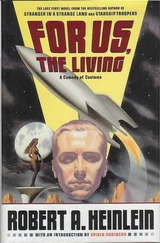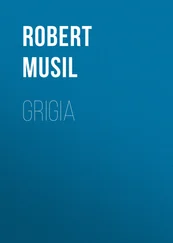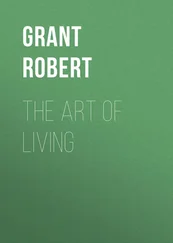Can you understand me when I say that my mother was in this figurative capacity a veritable lioness, though in her real life she was locked in the persona of a manifestly limited woman? She was not bright, by our way of thinking; she could disregard nothing and come to no major conclusions about life; nor was she, when I think back to my childhood, what you’d call a good person: she was vehement and always on edge. And you can well imagine what comes from the combination of a passionate nature and limited horizons — but I would like to suggest that another kind of stature, another kind of character still exists side by side with the embodiment that human beings take on in their day-to-day existence, just as in fairy-tale times the gods took on the forms of snakes and fish.
Not long after that incident with the aerial dart, I was taken prisoner during a battle in Russia. I consequently experienced a big change, and wasn’t so quick about getting back home, since this new life appealed to me for quite a while. I still admire the socialist system, but then one day I found that I could no longer mouth a few of the essential credos without a yawn, and so I eluded the perilous repercussions by escaping back to Germany, where individualism was just reaching its inflationary peak. I got involved in all sorts of dubious business ventures, in part out of necessity, in part simply for the pleasure of being back in a good old-fashioned country, where you can misbehave and not have to feel ashamed of yourself. Things weren’t going all that well for me then, and at times I’d say things were downright rotten. My parents weren’t doing so well either. And then my mother wrote me several times: we can’t help you, son; but if the little you’ll one day inherit would be of any help, then I’d wish myself dead for your sake. This she wrote to me even though I hadn’t visited her in years, nor had I shown the least sign of affection. I have to admit though that I took this for a somewhat exaggerated manner of speaking, and paid it no mind, though I didn’t doubt the honesty of feeling couched in these sentimental words. But then an altogether extraordinary thing happened: my mother really did fall ill, and it appears as if she then took along my father, who was very devoted to her.
Atwo reflected — She died of an illness that she must have been carrying around in her without anyone knowing it. One might suppose that it was the confluence of numerous natural causes, and I fear that you’ll think badly of me if I don’t accept this explanation. But here again, the incidental circumstances proved remarkable. She definitely didn’t want to die; I know for a fact that she fought it off and railed against an early death. Her will to live, her convictions, and her hopes were all set against it. Nor can it be said that a resolve of character overruled her inclinations of the moment; for if that were so, she could have thought of suicide or voluntary poverty long ago, which she by no means did. She was her own total sacrifice. But have you ever noticed that your body has a will of its own? I am convinced that the sum total of what we take to be our will, our feelings and thoughts — all that seems to control us — is allowed to do so only in a limited capacity; and that during serious illness and convalescence, in critical combat, and at all turning points of fate, there is a kind of primal resolve of the entire body that holds the final sway and speaks the ultimate truth.
But be that as it may, I assure you that my mother’s illness immediately gave me the impression of something self-willed. Call it my imagination, but the fact still remains that the moment I heard the news of my mother’s illness, a striking and complete change came over me, even though the message suggested no imminent cause for alarm. A hardness that had encompassed me melted away instantaneously, and I can say no more than that the state I now found myself in bore a great resemblance to my awakening on that night when I left my house, and to the moment of my anticipation of the singing arrow from above. I wanted to visit my mother right away, but she held me off with all sorts of excuses. At first she sent word that she looked forward to seeing me, but that I should wait out the lapse of this significant illness, so that she could welcome me home in good health. Later she let it be known that my visit would upset her too much for the moment. And finally, when I insisted, I was informed that recovery was imminent and that I should just be patient a little while longer. It seems as though she feared that a reunion between us might cause her to waiver in her resolve. And then everything happened so quickly that I just barely still made it to the funeral.
I found my father likewise ailing when I got there, and as I told you, all I could do then was to help him die. He’d been a kind man in the past, but in those last weeks, he was astonishingly stubborn and moody, as though he held a great deal against me and resented my presence. After his funeral I had to clear out the household, which took another few weeks; I was in no particular hurry. Now and then the neighbors came by out of old force of habit, and told me just exactly where in the living room my father used to sit, where my mother would sit, and where they themselves would. They looked everything over carefully and offered to buy this or that. They’re so thorough, those small-town types; and once after thoroughly inspecting everything, one of them said to me: It’s such a shame to see an entire family wiped out in a matter of weeks! — I of course didn’t count. When I was alone, I sat quietly and read children’s books; I found a big box full of them up in the attic. They were dusty, sooty, partly dried out and brittle, partly sodden from the dampness, and when you struck them they gave off an unending stream of soft black clouds; the streaked paper had worn off the cardboard bindings, leaving only jagged archipelagoes of paper behind. But as soon as I turned the pages, I swept through their contents like a sailor piloting his way across the perilous high sea, and once I made an extraordinary discovery. I noticed that the blackness at the top corner where you turned the pages and at the bottom edge of each book differed in a subtle but unmistakable way from the mildew’s design, and then I found all sorts of indefinable spots, and finally, wild faded pencil markings on the title pages. And suddenly it came to me, and I realized that this impetuous disrepair, these pencil scrawls and hastily made spots were the traces of a child’s fingers, my own child fingers, preserved for thirty some-odd years in a box in the attic, and long forgotten!
Well, as I told you, though it may for some people not be an earth-shattering event to remember themselves, it was for me as if my life had been turned upside down. I also discovered a room that thirty and some-odd years ago had been my nursery; later it was used to store linen and the like, but the room had essentially been left the way it was when I sat there at my pinewood table beneath the kerosene lamp whose chain was decorated with three dolphins. There I sat once again for many hours a day, and read like a child whose legs are too short to touch the floor. For you see, we are accustomed to an unbounded head, reaching out into the empty ether, because we have solid ground beneath our feet. But childhood means to be as yet ungrounded at both ends, to still have soft flannel hands, instead of adult pincers, to sit before a book as though perched on a little leaf soaring over the bottomless abysses through the room. And at that table, I tell you, I really couldn’t reach the floor.
I also set myself a bed in this room and slept there. And then the blackbird came again. Once after midnight I was awakened by a wonderful, beautiful singing. I didn’t wake up right away but listened first for a long time in my sleep. It was the song of the nightingale; she wasn’t perched in the garden bushes, but sat instead on the rooftop of a neighbor’s house. Then I slept on a while with my eyes open. And I thought to myself: There are no nightingales here, it’s a blackbird.
Читать дальше











